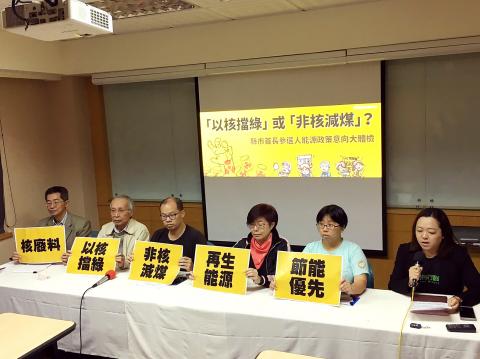A coalition of opponents of nuclear power plants yesterday launched a survey on energy policy and asked candidates in the Nov. 24 elections to clarify their views on issues such as phasing out nuclear power, disposal of nuclear waste and optimal energy-mix ratios.
While a referendum on scrapping the “nuclear-free homeland by 2025” of the Electricity Act (電業法) is to be held alongside the elections, candidates supporting it cannot evade its derivative questions, National Anti-Nuclear Action Platform spokesperson Tsuei Su-hsin (崔愫欣) said.
The survey poses nine questions about decommissioning the nation’s three operational nuclear power plants by 2025, resuming construction of the Fourth Nuclear Power Plant in Gongliao District (貢寮), New Taipei City, which was again mothballed in 2015, demarcation of storage sites for nuclear waste, energy-mix ratios, policies to promote sources of renewable energy and energy conservation.

Photo: Yang Mien-chieh, Taipei Times
Many Chinese Nationalist Party (KMT) candidates endorse the referendum, but contradict themselves by also campaigning against Japanese food imported from five areas following the 2011 Fukushima Dai-ichi nuclear disaster, Citizen of the Earth, Taiwan deputy executive Tsai Chung-yueh (蔡中岳) said.
Candidates in the east should voice their opinions about storage sites for nuclear waste, as less-populated Hualien and Taitung counties have been prioritized for such sites in discussions, Tsai said.
About 100,000 barrels of low-level radioactive waste has been stored at a site on Orchid Island (Lanyu, 蘭嶼), which is part of Taitung County, for more than three decades.
If the referendum is passed, it would not help cut air pollution as its proponents have claimed, as the proposal to have 40 percent of the nation’s power generated from coal-fired facilities is higher than the 30 percent envisioned by the government’s nuclear-free homeland policy, Tsai said.
The survey also asks candidates whether they would propose concrete policies to improve energy use efficiency to limit growth of electricity demand.
The responses are to be published on the Internet, Tsuei said.
In related news, five televised debates between the referendum’s initiators — Huang Shih-hsiu (黃士修) and Liao Yen-peng (廖彥朋) — and Deputy Minister of Economic Affairs Tseng Wen-sheng (曾文生), New Power Party Executive Chairman Huang Kuo-chang (黃國昌), Hung Shen-han (洪申翰), a member of the Executive Yuan’s Office of Energy and Carbon Reduction, as well as environmentalists Gloria Hsu (徐光蓉) and Lee Ken-cheng (李根政) — who oppose nuclear power — are to air from tomorrow to Nov. 21, according to a schedule announced by the Central Election Commission.

Alain Robert, known as the "French Spider-Man," praised Alex Honnold as exceptionally well-prepared after the US climber completed a free solo ascent of Taipei 101 yesterday. Robert said Honnold's ascent of the 508m-tall skyscraper in just more than one-and-a-half hours without using safety ropes or equipment was a remarkable achievement. "This is my life," he said in an interview conducted in French, adding that he liked the feeling of being "on the edge of danger." The 63-year-old Frenchman climbed Taipei 101 using ropes in December 2004, taking about four hours to reach the top. On a one-to-10 scale of difficulty, Robert said Taipei 101

Nipah virus infection is to be officially listed as a category 5 notifiable infectious disease in Taiwan in March, while clinical treatment guidelines are being formulated, the Centers for Disease Control (CDC) said yesterday. With Nipah infections being reported in other countries and considering its relatively high fatality rate, the centers on Jan. 16 announced that it would be listed as a notifiable infectious disease to bolster the nation’s systematic early warning system and increase public awareness, the CDC said. Bangladesh reported four fatal cases last year in separate districts, with three linked to raw date palm sap consumption, CDC Epidemic Intelligence

Taiwanese and US defense groups are collaborating to introduce deployable, semi-autonomous manufacturing systems for drones and components in a boost to the nation’s supply chain resilience. Taiwan’s G-Tech Optroelectronics Corp subsidiary GTOC and the US’ Aerkomm Inc on Friday announced an agreement with fellow US-based Firestorm Lab to adopt the latter’s xCell, a technology featuring 3D printers fitted in 6.1m container units. The systems enable aerial platforms and parts to be produced in high volumes from dispersed nodes capable of rapid redeployment, to minimize the risk of enemy strikes and to meet field requirements, they said. Firestorm chief technology officer Ian Muceus said

MORE FALL: An investigation into one of Xi’s key cronies, part of a broader ‘anti-corruption’ drive, indicates that he might have a deep distrust in the military, an expert said China’s latest military purge underscores systemic risks in its shift from collective leadership to sole rule under Chinese President Xi Jinping (習近平), and could disrupt its chain of command and military capabilities, a national security official said yesterday. If decisionmaking within the Chinese Communist Party has become “irrational” under one-man rule, the Taiwan Strait and the regional situation must be approached with extreme caution, given unforeseen risks, they added. The anonymous official made the remarks as China’s Central Military Commission Vice Chairman Zhang Youxia (張又俠) and Joint Staff Department Chief of Staff Liu Zhenli (劉振立) were reportedly being investigated for suspected “serious